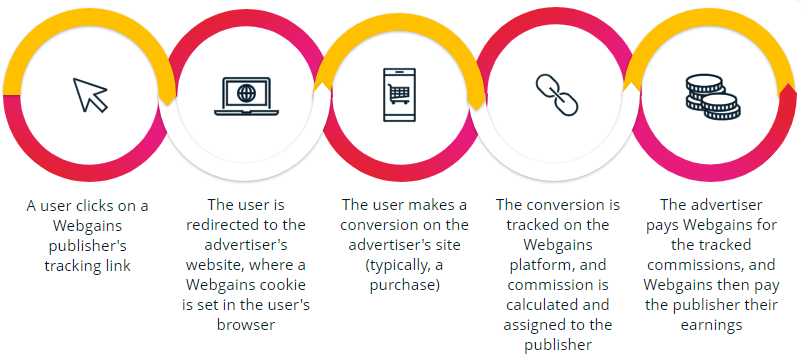How do Tracking and Cookies work in Affiliate Marketing?
1. The Role of Cookies in Affiliate Marketing
What are Cookies? Cookies are small text files that websites place on a user's device (like a computer or smartphone) when they visit a site. These files store information that can be used to track and remember the user's activities on the website.
Why are Cookies Important? In affiliate marketing, cookies are crucial because they help track which publisher (affiliate) referred a customer to the advertiser's website. This ensures that the correct publisher gets attributed (and commission) for the sale.
2. How Tracking Works
Step-by-Step Process:
Tracking Links:
A publisher promotes a product using a unique tracking link provided by the affiliate network, such as Webgains, for that advertiser’s program. When clicked, it will redirect the user to the advertiser’s website.
This link also contains certain tracking details that helps to identify the referral publisher.
Click and Cookie Placement:
When a customer clicks on the tracking link, they are redirected to the advertiser's website.
As they land on the site, a cookie is placed on their device. This cookie contains information about the publisher who referred the customer.
Tracking the User’s Actions:
The customer might explore the website, and if they decide to make a purchase, the cookie helps track that this customer was referred by the publisher.
Credit and Commission:
Once the purchase is made, the cookie helps the network identify which publisher should be attributed the sale.
The publisher is then paid a commission for the sale, which is often a percentage of the sale amount.
Example: Imagine Sarah is a food blogger who loves a certain brand of kitchen gadgets. She writes a blog post about her favourite blender and includes a tracking link to the blender on the advertiser’s website. A reader clicks on the link, a cookie is placed on their device, and if they purchase the blender, Sarah earns a commission.

3. The Importance of Cookie Duration
What is Cookie Duration? Cookie duration, or "cookie life," refers to how long the cookie will stay on the customer's device. If the customer makes a purchase within this time frame, the publisher will be credited.
Typical Cookie Durations:
Some cookies last only 24 hours.
Others might last 30 days, 90 days, or even longer.
For Webgains programs, the default cookie period is 30 days.
Why Cookie Duration Matters: A longer cookie duration increases the chances of the publisher getting credited for a sale, even if the customer doesn't buy immediately after clicking the link.
In our earlier example, a reader could click on Sarah’s tracking link and be taken to the advertiser’s website, but not make a purchase for a few days. But, Sarah can still be attributed the sale if her referral was the last-click the user made to that retailer’s website.
4. Best Practices for Publishers
Promote Products You Believe In: Authenticity matters! Choose products you trust and that fit your audience.
Disclose Relationships: Always be transparent with your audience about affiliate tracking links.
Understand the Advertiser’s Cookie Policy: Know the cookie duration and how commissions are tracked and paid.
5. Conclusion
Affiliate tracking and cookies are the backbone of affiliate marketing. Understanding how these systems work helps you navigate the affiliate marketing world effectively, ensuring you get rewarded for the customers you refer.
